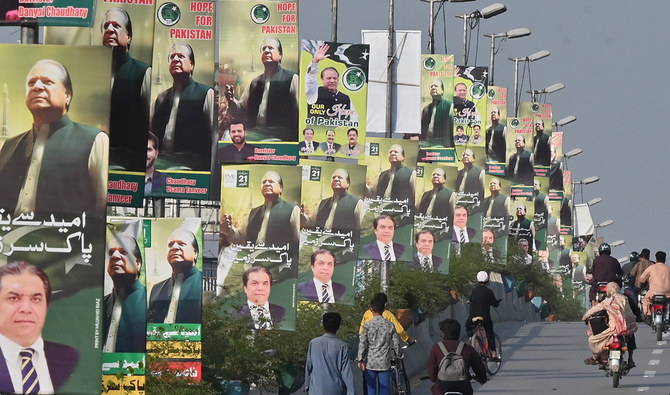ISLAMABAD: Nawaz Sharif, three-time former prime minister of Pakistan, will announce an economic recovery plan today, on Saturday, at a rally in Lahore that marks his return to home after nearly four years, his party said, with caravans of supporters from across the South Asian country en route to the eastern city to welcome their leader.
The founding leader of the Pakistan Muslim League-Nawaz (PML-N) party had been living in London in self-exile since November 2019, when he secured medical bail after his conviction in two corruption references, while the country was ruled by the rival political faction of ex-premier Imran Khan.
Ahead of his return early Saturday, Sharif secured protective bail from the Islamabad High Court till October 24 in the corruption references against him. His comeback comes at a time when Pakistan is mired in political and economic crises.
Sharif’s party says the former premier would kick start its campaign for the upcoming nationwide elections and claims that his return to power for the fourth time would help revive the economy and provide relief to people hit by double-digit inflation fueled by exorbitant energy price hikes.
“Nawaz Sharif is bringing a robust economic plan with him to revive the country’s economy and he will be unveiling this tomorrow in the rally,” PML-N joint-secretary Tallal Chaudhry told Arab News.
“The total focus of Sharif’s politics in Pakistan is improving lives of common people through economic recovery.”
He said caravans of PML-N supporters were en route to Lahore from across Pakistan to welcome back their leader. “We are getting an extremely good response from the public as tens of thousands are on their way to Lahore,” he said.
The Election Commission of Pakistan (ECP) has announced that it would hold general elections in the country in the last week of January as the process to redraw hundreds of federal and provincial constituencies is expected to be completed by the end of November.
After the exercise, the election regulator would announce its schedule for polls, giving at least 54 days to all political parties and candidates for the election campaign.
“Nawaz Sharif will be kicking off the party’s election campaign from Lahore rally, and then he will be leading it by addressing public gatherings in different cities,” Chaudhry said.
“We are confident to win a landslide victory in the polls to form our government,” he claimed, adding that Sharif’s return to power will help bring political and economic stability to the country.
The South Asian country has been facing political and economic chaos since April last year, when Khan was ousted from power in a parliamentary vote of no-confidence. Khan is currently in jail in a case relating to illegal sale of state gifts, while several of his close aides have parted ways with him in recent months.
Political analysts call Sharif’s homecoming an “encouraging sign” for the country’s fragile democracy, but believe that economic and political stability would remain elusive, if free and fair elections were not held in the country.
“It is obvious now that the leader of one party is getting relief from courts while the other one is faced with numerous legal challenges ahead of the elections,” said Adnan Rehmat, a political analyst, referring to Sharif and Khan.
He said the electoral process would help revive political and economic activity in the country, which could be sustained through free and fair elections.
“If credibility of the polls remains questionable, then forget any kind of stability which is a pre-requisite for the economic revival,” Rehmat said.
Dr. Hassan Askari Rizvi, a senior political commentator, said all political parties and their leaders should be allowed to freely contest the polls and form the government, no matter whichever of them wins the majority.
“We will see after the election regulator announces the election schedule, if a level playing field is available to all contesting candidates and parties,” he told Arab News.
“Everybody knows the recipe for the country’s economic stability and prosperity is free and fair elections.”
















